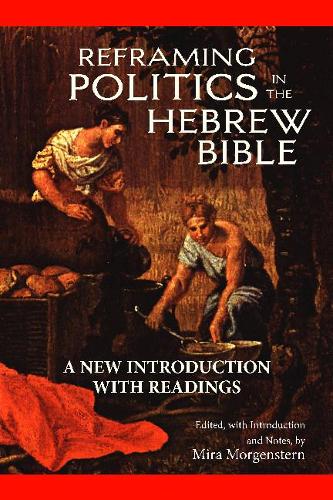
Reframing Politics in the Hebrew Bible: A New Introduction with Readings
(Paperback)
Available Formats
Publishing Details
Reframing Politics in the Hebrew Bible: A New Introduction with Readings
By (Author) Mira Morgenstern
Hackett Publishing Co, Inc
Hackett Publishing Co, Inc
1st December 2017
United States
Classifications
General
Non Fiction
221.832
Physical Properties
Paperback
434
Width 152mm, Height 229mm, Spine 20mm
581g
Description
Reframing Politics in the Hebrew Bible goes beyond the pioneering interpretations of various biblical texts penned by such noted Bible students as Spinoza, Rousseau, and Angelina Grimk to present an introduction to the Hebrew Bible as a whole from the perspective of a modern-day political theorist. In doing so, it offers a brilliant thematic guide to the Hebrew Bible's most politically salient passages, complete with text and commentary. Morgenstern's account of the significance of these ancient yet strangely modern texts will fascinate students of both ancient and modern political theoryas well as all readers of the Hebrew Bible itself.
Reviews
"The fields of Jewish political thought and political readings of the Hebrew Bible are newly emergent and rapidly growing, but prior to Mira Morgenstern's Reframing Politics in the Hebrew Bible , there has been no comprehensive scholarship that pulled everything together in a coherent way and served as a stimulus to new researchlet alone to teaching. Reframing Politics in the Hebrew Bible achieves both aims and displays the same care, intelligence, and originality that characterize the author's earlier scholarship. Morgenstern's selection of biblical passages is judicious, and her extensive Introduction and commentaries comprise a learned treatise that rivals any existing interpretation of the political meanings of the Hebrew Bible/Old Testament. The pedagogical and scholarly quality of Morgenstern's volume is suggestive of The Jewish Study Bible (Second Edition, Oxford University Press, 2014), the standard reference work in the field and one that, like her own volume, is anything but a 'textbook.' Morgenstern's biblical readings are a marvelous blend of literary and social-political analyses that are powerful and persuasive and yet subtle without being dogmatic, leaving open, and indeed encouraging, rival interpretations. To step into the figurative minefield of biblical interpretation and to retain the 'neutrality' that is central to all academic endeavors is no mean accomplishment, and with this new work, Morgenstern will cement her much-deserved place in biblical scholarship. A superb work in every respect." Gordon Schochet, Professor Emeritus of Political Science, Rutgers, The State University of New Jersey, and Founding Executive Editor of Hebraic Political Studies
" An exceptionally fine contribution to Jewish political theory . . . . Morgenstern presents here an approach to the Hebrew Bible in what many would consider a nuanced manner, taking the entire tract as a complete narrative and recognizing that its composition emerged over some period of time, but simultaneously recognizing in it a particular set of values. Following an extensive and comprehensive introductory essay . . . are chapters by topic covering politics: cities as the locus of power; covenants as contractual arrangements between God and the people; treaties as a means of creating relationships with the Israelites' neighbors; foreign affairs; leadership; monarchy. Political values are covered by a discussion of justice, violence, and civil war. Human rights, a theme that has come to prominence in contemporary times, finds coverage in the Hebrew Bible with Morgenstern looking at women, social order, and secularization in an otherwise religious text. There are some outlying themes that are interesting in terms of psychology, such as dreams and the creation of an Israelite national identification. Each topic selected is given with a particular context, then, most importantly, supplemented by a related passage from various components of the Hebrew Bible. While Jewish political theory is a relatively new subject of academic study, Reframing Politics in the Hebrew Bible ought to serve as a mainstay text for interested students ." Sanford R. Silverburg, Catawba College, in AJL Reviews
"Mira Morgenstern has provided university and seminary teachers with a tool to engage their students in a rational, informed discussion of the Bible on both political theory and practical politics. She offers her readers an extensive anthology of texts from the Hebrew Bible with short introductions to elucidate 'the contributions to political theory represented in its texts.' A comprehensive fifty-one-page introduction precedes the anthology of biblical texts. "Morgenstern recognizes that neither 'political' nor 'theory' is a biblical term. Still, biblical texts deal with human behavior in an ordered society and speak of institutionalized political practices and promote a view of human beings and their society that assumes their transcendent value. What this anthology does is present specific texts in which ancient Israel's political theory is implicit. "An excellent resource for students of political science who wish to explore the influence of the Bible on contemporary political theory by reading actual biblical texts rather than depending solely on secondary sources. It could also serve as collateral reading in courses that introduce students to the Hebrew Bible, since it illustrates how the biblical tradition can be appropriated in reflecting on contemporary political issues." Leslie J. Hoppe, OFM, Catholic Theological Union , in the Review of Biblical Literature
"A fantastic resource for students of both the Bible and political thought, readers stand to gain much from Morgenstern's collection of sources. Her questions probe timeless themes. (See, for example, her raising the question, in the context of Cain founding the first city, whether the Hebrew Bible 'invite[s] the reader to consider whether the (moral) essence of a development is determined by its roots or by its consequences.') Even her passing comments are profound. (She notes that contrary to the Greeks, the Israelite mentality does not celebrate the practice of warfare.) Her volume will serve as an educational, political, and spiritual source of meaning for as long as the biblical texts continue to be mined by those seeking a deeper understanding of the human political condition." Rabbi Dr. Stu Halpern, Yeshiva University
Author Bio
Mira Morgenstern is Professor of Political Science, The City College of New York.
